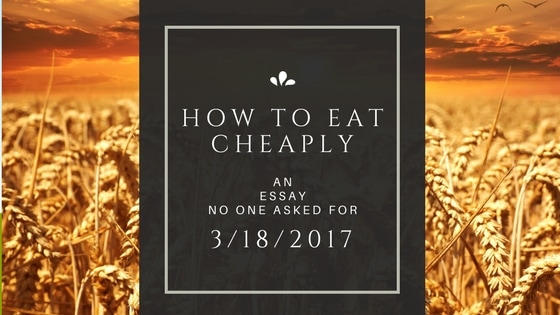|
Since graduating with a degree in Theatre Performance six years ago, I have, for the most part, spent my days as an actor working for small professional theatres in odd corners of our vast and multi-cornered country. This odd work history has left me with a random carpetbag of “special” performance skills, several collections of memorable anecdotes, and a few (poverty-induced) insights. I thought that for this FIRST essay no one asked for I would trot out an example of the latter. I present, for your bemusement and possible alarum, a poverty-induced insight. The following is my ACTUAL game plan for eating on a small-time actor paycheck.
But first, a short, explanatory interlude. This is not going to be a food blog. I am not a chef, and hopefully you are not currently having to pay for food using a monetary supply comprised mostly of pennies. This is probably not going to add anything to your life. If, perchance, you ARE a young, aspiring actor-in-training who has stumbled upon this blog, these tips may prove useful. As soon as you graduate school, you will NEED such stratagems. Everyone else, feel free to simply shake your head and marvel at my voluntary follies. These are the sorts of things one really does do for love. Back to the business at hand. When most people begin to contemplate eating on the cheap, their thoughts inevitably turn towards Ramen, that food favorite of cash-strapped college kids the world over. It is indeed inexpensive, but it is PACKED with body-inflating sodium and eating it three meals a day will swiftly force you to think the grimmest of grim thoughts. Avoid this. There are other ways. In order to stave off both boredom and depression, you need to eat different things for each meal every day. Also, focus on HEALTHY inexpensive fare. Many cheap foods are full of crap that kills you slowly. When formulating this cheap diet, I operated under the assumption that we in America do not traditionally eat enough plants; therefore, most of the foods (though NOT all) contained herein are plant-based. If you ARE budgeting this stringently, affording healthcare is no doubt also a concern. Why increase your need for pricy doctors, drugs, and sundry by failing to eat your fruits, veggies, and whole grains? The latter can be surprisingly affordable if you play your cards correctly. For breakfast, I recommend oatmeal. Buy it in the big tubs to save pennies. Just add water and a little salt and cook it (salt and water are dirt cheap). Then add whatever extras you can scrounge. I like mine with a little honey, peanut butter, and cinnamon. This ends up being much cheaper then milk and processed cold cereals. And I find it keeps you feeling fuller longer. Eggs and toast are another good breakfast option, though you can eat them anytime. I DO. Just buy the best eggs you can afford (the cheapest ones are better than nothing) and always get bread that says 100% whole wheat. (White bread is basically cake to your stomach, and “multi-grain” is typically 49% white flour. If a company can cut corners, it will.) Eat fruit every day. Watch for what is in season and inexpensive and buy that. I tend to always have apples and oranges around, and I tend to eat at least one of each a day, usually at breakfast or lunch. Berries are great. Frozen ones are cheaper, and since they are flash frozen shortly after being picked, they are actually “fresher” than the fresh ones nutritionally speaking, which have usually been sitting on a shelf for a goodly while. Eaten while still frozen, they are a healthy popsicle. (Also, freeze grapes. They are DELICIOUS that way. You are welcome in advance.) While we are on the subject of frozen foods, I will share another hard-won truth. Buy frozen vegetables. A lot of frozen foods are bad for you, but the frozen veggies aren’t. They are cheap. And they stay frozen in your freezer till you are ready to use them. Buying fresh vegetables in the heat of passion, when you are flushed with nobly inflated notions of cooking them all soon is ALWAYS a mistake. You will forgo and forget and end up chucking half of them out when they swiftly spoil. BUY FROZEN. And actually eat them. Preferably with each meal. Always be eating veggies. Noting my rapidly escalating word count, I will make a quick call. It would be needlessly tedious for me to list all the possibilities for cheap lunches and dinners. While there is theoretically digital space to spare here on my site, your interest is definitely limited. Let me instead focus on a few of my primary findings. CARBS ARE YOUR FRIENDS. As long as you are active (and actors are, when performing), the concern most people feel over them is misguided. As long as you stick to the proper sorts and practice reasonable moderation, you needn’t fear them, unless you have found yourself to be particularly reactive to them (i.e. unless you KNOW they alone make YOU gain weight). Stick with whole grain pastas, whole potatoes (skins and all), and brown rice, for they are all cheap AND nutritious. Buy them all in the big bags to save pennies. PROTEINS ARE IMPORTANT, BUT CALM DOWN ABOUT THEM. All foods, even plants, contain some proteins, which, yes, your body does need. So, eat all sorts of plants and add some animal proteins as you can afford them and don’t panic. We aren’t all body-builders, looking to gain forty pounds of muscle in three months. If that is not your goal, you do not have to eat like it is. A few inexpensive protein choices include the aforementioned eggs, chicken, pork chops, some steaks (“eye of round” is a good cheap cut), and (occasionally) tuna. (Bigger fish like tuna live longer and thereby build up higher levels of mercury. Smaller fish such as sardines can offer the same health benefits with lower risks. I recommend sardines on top of avocado on toast, an idea I stole from Alton Brown.) FINALLY, I CANNOT RECOMMEND BEANS HIGHLY ENOUGH. Beans get a bad rap, as we all know. If your innards are not accustomed to beans, they WILL react with noisy protest when they confront something that contains so much nutrition and fiber. Yes, they can be murder on your personal atmosphere, but I find this effect diminishes quickly over time. In essence, your body adapts; it is amazing what the human body can do. During this transformation phase, just open windows and take walks. If you are pinching pennies, buy the bags of dried beans. Soak them overnight, then rinse them off and stew them for an hour and a half with a chopped onion and some garlic, adding hot sauce and salt to taste during the final half hour or so. These spicy beans make other things, such as a baked potato or brown rice, taste significantly less punishing, and they add a super inexpensive protein source to your underfunded edible arsenal. Store them in a large container in the fridge and ladle them on anything that needs a dash more flavor. Just don't ladle them on desserts. Thus ends the first essay. If you would care to challenge my nutritional assumptions, or if you would like for me to point you towards the books that back them up, leave a comment below. It has been six years since I graduated college, as I said at the start, and as no one forces me to cite sources these days, I have fallen (gleefully) from the practice.
1 Comment
Aunt Cynthia
3/18/2017 02:34:59 am
Great blog, Dude. I have always said grow a planter box of salad...all seeds of the toppings included and you can take it with you whenever you travel to a new location. Thanks for the information, hopefully it helps several low income people...will defiantly look forward to seeing what is next.
Reply
Leave a Reply. |
AuthorPhilip David Black is an actor, educator, voice over artist, and blog author. Someday he may write books. Until then, he blogs . Archives
June 2018
Categories |


 RSS Feed
RSS Feed